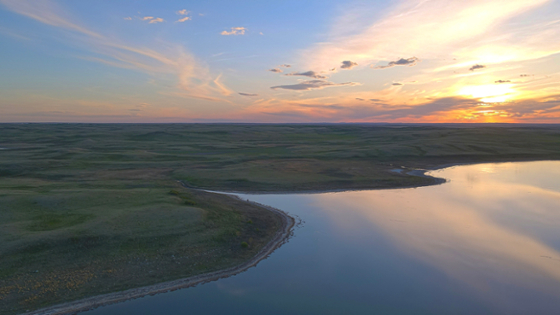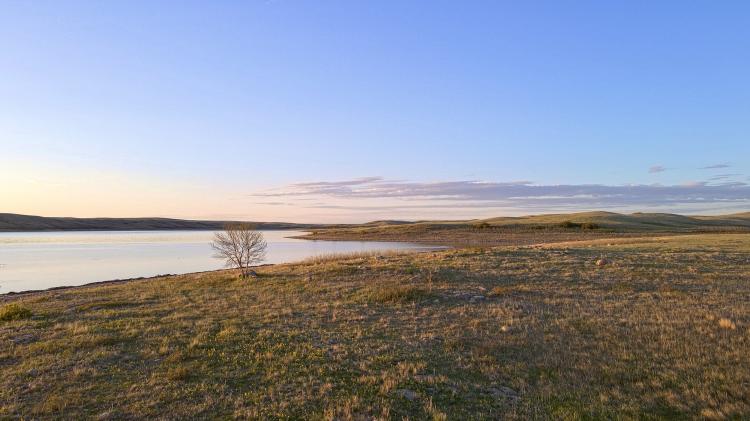
Nature Conservancy of Canada's Lonetree Lake property Photo: Gabe Dipple. Courtesy of NCC
When U of R professor Marc Spooner learned he was getting a $285 rebate from Saskatchewan Government Insurance last year, the wheels in his head began to turn with all the possibilities for the funds. While some might have opted to put the extra cash towards a staycation, Spooner looked outward and consulted with his community to direct their rebates towards a collective goal - purchasing and preserving a tract of Saskatchewan's endangered grassland.
"When people think of endangered ecosystems, they often think of the rainforests, but Canada's grasslands are some of the most endangered habitat on earth," Spooner says. "I thought it was a great opportunity to pool our rebates and apply it to a legacy project." Spooner put the call out on Facebook, and before long, his Field of Dreams Facebook group had grown to more than 900 members, and more than $100,000 had been raised towards the project. Faced with the challenge of how to shepherd the funds, Spooner set about the task of finding an organization that would make the best use of the money. Members of the Field of Dreams group had made it clear that the project should have conservation, stewardship, and Indigenous input at its core, and Spooner found that the Nature Conservancy of Canada (NCC) fit the bill.

NCC's Lonetree Lake property // Photo: Gabe Dipple. Courtesy of NCC
"The NCC does amazing work," he says. "They're well respected by farmers and by environmentalists, they have an Indigenous Advisory Circle, and more and more, they're becoming more Indigenous-informed." He points out that the 629-hectare Lonetree Lake property purchased through the Nature Conservancy of Canada meets the Canada/U.S. border. That demarcation is also known as the Medicine Line to Indigenous people, and the entire area is of significant cultural and spiritual importance.
Nature Conservancy of Canada says that over the past 25 years, Saskatchewan has lost more than 809,000 hectares (2 million acres) of native grassland with less than 20 per cent remaining intact. The Lonetree Lake property is now owned by NCC and will be preserved for future generations. "When we purchase land we also put quite a significant percentage of the land value into an endowment fund for the stewardship of the land in-perpetuity," says Jennifer McKillop, NCC Saskatchewan's Regional Vice-president. "So any kind of work that needs to be done, whether that be invasive species management or grazing, we'll have the ability to steward those lands. We're also working hard to engage with Indigenous communities to ensure that they feel welcome on the land. That's particularly important because there has been less and less access to land in southern Saskatchewan, so land owned by NCC can be used for ceremonies or land-based education. That whole area is really rich from an archeological and cultural resources perspective."
NCC's Lonetree Lake property
Photo: Gabe Dipple. Courtesy of NCC
On Wednesday, June 22, Spooner will be joined by his fellow donors and other friends of the project as they gather at the Lonetree Lake property. The celebration will include presentations by NCC program director Michael Burak, Elder Pete Bigstone, and local rancher Ross McDonald, followed by a tour of the land with Knowledge Keepers who will speak about the cultural significance of the land, and a conservation biologist who will speak about the biodiversity in the area.
For his part, Spooner is delighted with the result of his Facebook shout out. "It was another way for Saskatchewan to come together," he says. "This project has crossed all walks of life and political stripes. It also cuts across time: My kids' kids could one day walk across that preserved land. It feels great."
Celebrating Grassland Conservation - A Field of Dreams Tour
Wednesday, June 22, 2022 from 1 - 4 p.m.
Lonetree Lake
49.021300, -104.521553
Gladmar, SK
Learn more about this event and register for free via Eventbrite.











